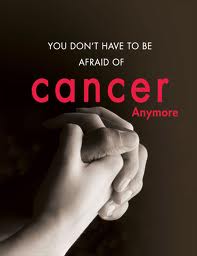 |
| cancer |
cancer or malignant neoplasms is a disease characterized by a typical cell cycle abnormalities that give rise to cells' ability to:
1.uncontrolled growth (cell division beyond the normal limits)
2.attacked the nearby biological tissue.
3.migrate to other body tissues through blood circulation or lymphatic system, called metastasis.
Three characters that distinguish this malignant cancer from benign tumors. Most cancers form a tumor, but some do not, such as leukemia. The branch of medicine dealing with the study, diagnosis, treatment, and prevention of cancer are called oncologists.
In general, cancer cells form a tumor, except in leukemia. The reaction between acid tetraiodotiroasetat by inhibiting the activity of integrins is the hormone thyroxine and tri-iodotironina which is one of the factors that play a role in angiogenesis and tumor cell proliferation. [2] Uncontrolled growth is caused by damage to DNA, causing mutations in vital genes that control cell division . Some mutations may be required to transform normal cells into cancer cells. These mutations are often caused by chemical or physical agents called carcinogens. Mutations can occur spontaneously (obtained) or inherited (germline mutations).
Cancer can cause many different symptoms, depending on the location and character of the malignancy, as well as the presence or absence of metastasis. Diagnosis usually requires microscopic examination of tissue obtained by biopsy. Once diagnosed, cancer is usually treated with surgery, chemotherapy, or radiation.1.uncontrolled growth (cell division beyond the normal limits)
2.attacked the nearby biological tissue.
3.migrate to other body tissues through blood circulation or lymphatic system, called metastasis.
Three characters that distinguish this malignant cancer from benign tumors. Most cancers form a tumor, but some do not, such as leukemia. The branch of medicine dealing with the study, diagnosis, treatment, and prevention of cancer are called oncologists.
In general, cancer cells form a tumor, except in leukemia. The reaction between acid tetraiodotiroasetat by inhibiting the activity of integrins is the hormone thyroxine and tri-iodotironina which is one of the factors that play a role in angiogenesis and tumor cell proliferation. [2] Uncontrolled growth is caused by damage to DNA, causing mutations in vital genes that control cell division . Some mutations may be required to transform normal cells into cancer cells. These mutations are often caused by chemical or physical agents called carcinogens. Mutations can occur spontaneously (obtained) or inherited (germline mutations).
Most cancers cause death. Cancer is one of the leading causes of death in developing countries. Most cancers can be treated and many cured, especially if treatment begins early. Many forms of cancer associated with environmental factors that could have been avoided. Smoking can cause cancer than many other environmental factors. Tumor (Latin: swelling) appoint an abnormal mass of tissue, but can be a "malignant" (cancerous) or "benign" (not cancerous). Only the malignant tumors that can invade other tissues or metastasize. Cancer can spread through the lymph nodes and blood vessels to other organs.





0 comments:
Post a Comment